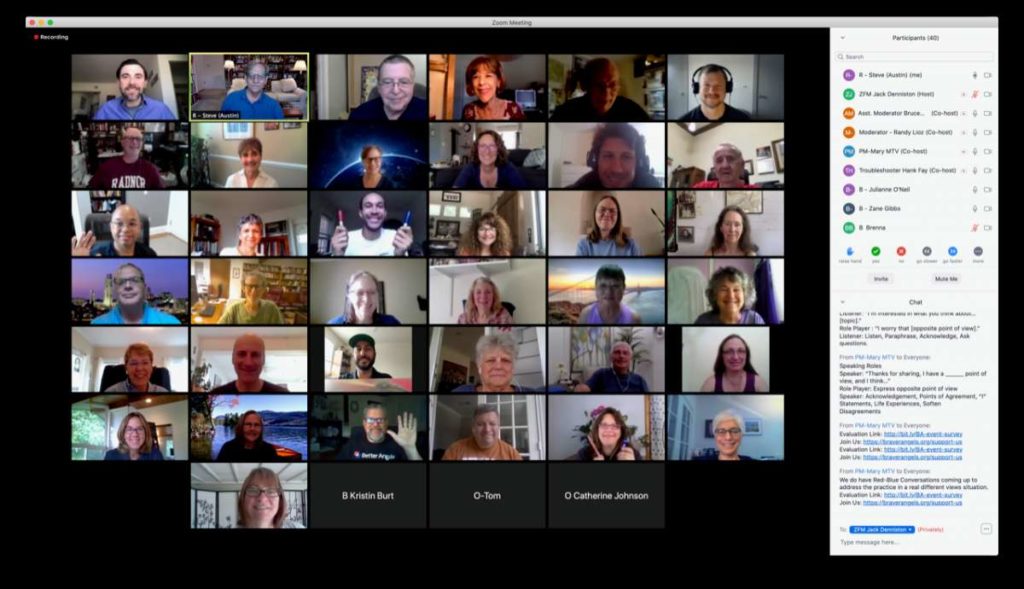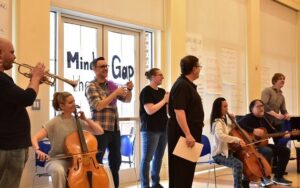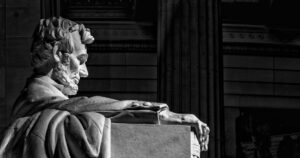[from the Albany Times Union]
Better Angels was founded in the battleground state of Ohio during the last presidential race by Hillary Clinton and Donald Trump supporters worried that rage was ripping America apart. It’s become a nationwide interfaith, diverse group. In 2020, the name was changed to Braver Angels to reflect the courage often required to bridge political and religious divides. Just before the pandemic lockdowns, David Rowell and Bruce France were spurred by their religious beliefs to found a chapter in the Capital Region.
Q: Could you please describe your religious backgrounds or spiritual practices and how they prompted you to join this effort?
Dave: I’m a parishioner at St. Vincent de Paul Catholic Church in Albany. I believe that each person is made in God’s image. Braver Angels treats all people with respect and dignity despite political differences, which reinforces his faith.
Bruce: I attend Emmaus United Methodist Church in Albany. Many United Methodist congregations, like other denominations and faiths, are divided politically. These divisions beg to be addressed by a framework that addresses compassion and understanding. I believe we are called to love our God and love our neighbor. Many issues can only be addressed with appropriate listening and speaking skills which are the heart of the Braver Angels philosophy. We can’t be listening if we are shouting at each other. There is a great need to look for what we agree on and not what we disagree on. That is how we show love for our God and our neighbor.
Q: What’s happened since the first workshop? How many attendees self-identify as blue, how many red?
Bruce: We had a Skills for Bridging the Divide Workshop designed to improve communication skills for people with different views. That was followed by a Red/Blue Workshop in Guilderland where people of opposite political persuasions had conversations to understand their differences and find common ground. Seven “reds” and seven “blue” attended it.
About ten people then formed the Capital District Braver Angels Alliance. Before the pandemic, we held 15 general information sessions, nine skills workshops, four Red/Blue workshops and two debates. Our debates don’t have winners or losers but aim to better understand competing views about a topic. Events were spread around the Capital District as far north as Glens Falls.
After the pandemic hit, Braver Angels suspended in-person events and had three Zoom workshops online. We hope to resume workshops very soon and expand to activities such as policy and book discussions.
Q: Do people of different faiths use Braver Angels’ methods to discuss divisive religious issues?
Bruce: We have examples of people of different faiths coming together as a result of workshops. One of our first workshops included a liberal Muslim and conservative Christian who interacted. As a result, each agreed to visit the other’s house of worship.
We’ve conducted church workshops. Braver Angels is very applicable to congregations across America. Many are divided politically as are entire denominations. An example is the potential break-up of the United Methodist Church nationally and locally with Bishop Love with the Episcopal Church. Braver Angels workshops are a great resource for all congregations–Christian, Jewish, Muslim, others–divided politically. They can use Braver Angel Workshops to help different sides talk.
Q: Has anyone in your group used Braver Angels with family?
Dave: My friend recently visited relatives. She expected the time might be difficult due to prior difficult political conversations with her brother-in-law. The presidential debate occurred during her visit. Braver Angel guidelines, including when to back away when conversation is too hard, made her visit go better than expected. She could respond appropriately if conversation became toxic.
She responded successfully to “gotcha” questions designed to trap her, as opposed to those asked for true understanding, using tools like active listening and finding areas of agreement.
The intent is not to change someone’s mind but to listen with respect and present your position with statements about how you feel rather than spout facts and figures that can be debated. This often leads to both sides feeling they’ve been heard and respected.
Q: Have you ever had to ask someone to leave for violating rules of civility?
Bruce: No. Dave and I are both trained Braver Angels moderators. In that role, we are taught how to redirect people who aren’t participating as designed. Because of self-selection among participants, this isn’t a significant issue in our workshops.
Braver Angels developed the “With Malice Towards None” initiative for use after the election. There will be winners and losers giving rise to a wide range of emotions. The (aftermath) could begin a dark time of polarization in the land—unless we act together to make it otherwise. Materials will be available for religious groups, colleges and civic organizations to lead conversations about divisions uncovered by the election.
“Malice Towards None” includes the “Hold America Together” pledge. Signers of this pledge are asked not to demonize those who vote differently, to disavow election violence and work together if our institutions cannot produce a consensus on who is legitimately elected president.
We hope this is not needed.
See the full article:




